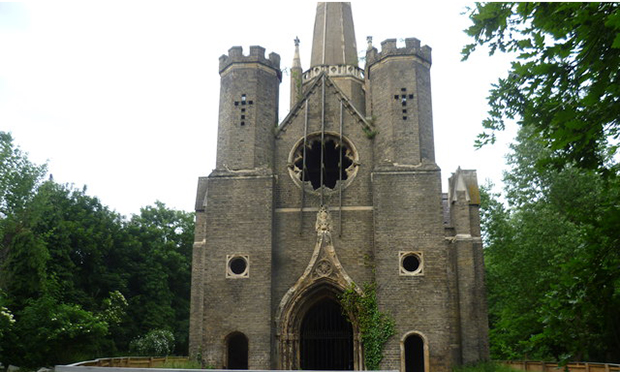Council restoration of Abney Park chapel ruins in sight

Abney Park Cemetery Chapel. Photograph: Marathon.
The ruins of one of Europe’s oldest non-denominational chapels is set for a rebirth after Hackney Council announced a £314,000 first leg of renovation plans.
Stoke Newington’s Abney Park Cemetery Chapel is the only surviving public building by architect William Hosking, according to the Victorian Society.
The chapel, which had hoardings erected around it by the council for safety reasons in 2014, has come in for a beating over the years, with interference of the contents of its catacombs even leading to rumours of the practice of dark magic on the site.
Hackney Mayor Philip Glanville said: “[This report] recommends grant spending on the restoration and improvements to Abney Park Cemetery Chapel – one of the ‘magnificent seven’ garden cemeteries in London, with a woodland memorial park and local nature reserve managed by the council.
“This historic site will receive lottery grant funding that the council applied for, to maintain and improve a green space that residents can enjoy and contribute to a more sustainable Hackney.”
Works to improve the site are expected to cost around £4 million, which will be provided by the Heritage Lottery Fund if the council is successful in Phase 2 of its funding application.
The council will be using £314,000 in grant funding to develop a Stage 2 bid for the development phase of the project. If this application is successful, the Heritage Lottery Fund will provide circa £4.4 million to deliver a number of the improvements to Abney Park.
Abney Park garden cemetery was laid out in 1840, and the council has been working on stabilising Hosking’s gothic centrepiece, though there are still “significant issues” with the structure.
Mayor Glanville also made funding announcements of over £6 million to be spent on facilities for 14 different primary schools across the borough, as well as £834,000 in upgrade works to Hackney Service Centre.
Edit – This article was updated on 19 December at 12:03 to make clear that the £314,000 will be used to develop a Stage 2 bid for the development phase of the project.
